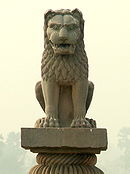- Mangala Sutta
-

Countries
Sri Lanka
Cambodia • Laos
Burma • ThailandHistory
Pre-sectarian Buddhism
Early schools • Sthavira
Asoka • Third Council
Vibhajjavada
Mahinda • Sanghamitta
Dipavamsa • Mahavamsa
BuddhaghosaDoctrine
Saṃsāra • Nibbāna
Middle Way
Noble Eightfold Path
Four Noble Truths
Enlightenment Stages
Precepts • Three Jewels
Outline of BuddhismThe Mangala Sutta (Burmese: မင်္ဂလသုတ် Mingala thoke, Thai: มงคลสูตร , Khmer: មង្គលសូត្រ mongkhol sut) is a discourse (Pali: sutta) of the Buddha on the subject of 'blessings' (mangala, also translated as 'good omen' or 'auspices').[1] In this discourse, the Buddha describes 'blessings' that are wholesome personal pursuits or attainments, identified in a progressive manner from the mundane to the ultimate spiritual goal. In Sri Lanka this is known as "Maha Mangala Sutta" and this sutta considered to be part of "Maha Pirith".
This discourse is recorded in Theravada Buddhism's Pali Canon's Khuddaka Nikaya in two places: in the Khuddakapāṭha (Khp 5), and in the Sutta Nipāta (Sn 2.4).[2] In the latter source, the discourse is called the Mahāmangala Sutta. It is also traditionally included in books of 'protection' (paritta).
Contents
Content
It was preached at Jetavana Temple in answer to a question asked by a deva as to which things in this world could truly be considered blessings (mangalāni). The sutta describes thirty-eight blessings in ten sections,[3] as shown in the table below:
Gp.1 Not associating with fools Associating with the wise Expressing respect to those worthy of respect Gp.2 Living in an amenable location Having meritorious deeds in one's past Setting oneself up properly in life Gp.3 Learnedness Artfulness Self-discipline Artful speech Gp.4 Filial piety Cherishing one's children Cherishing one's spouse Not leaving work undone Gp.5 Generosity Dhamma practice Caring for extended family Blameless work Gp.6 Avoiding unwholesomeness Not drinking intoxicants Non-recklessness in the Dhamma Gp.7 Respect Humility Contentment Gratitude Listening regularly to Dhamma teachings Gp.8 Patience Openness to Criticism Sight of a True Monk Regular discussion of the Dhamma Gp.9 Practising Austerities Practising the Brahma-faring Seeing the Four Noble Truths Attainment of Nirvana Gp.10 Mind free of Worldly Vicissitudes Sorrowlessness Free of Subtle Defilements Blissful Mind Maha Mangala Sutta
Evang Me suthang Ekan samayan Bagawa Savaththiyan Viharathi Jethavane Anatha Pindikassa Arame Athako Anggnatharaya devatha abhikkanthaya Raththiya Abbikkanthavanna kevala kappan jethawanam Obasethwa Yena bagawa thenupasankaming upasankamiththa Bagawanthang abhiwa dethwa Ekamanthn attasi akamanthang thitakosa Deavatha Bagawanthang Ghathaya Ajjagasi
1.
Bahu Deva Manussacha - Mangalani Achintha ung Akankha Mana Soththanan - Bruhi Mangala Muththa mang
2.
Asewanacha Balanam - Pandithanancha Sevana Pujacha Puja neeya nam - Ethang Mangala Muththa mang
3.
Pathirupa Desa Vasocha Pubbetha Katha Punna tha Aththa Samma Panidicha - Ethang Mangala Muththa mang
4.
Bahuschchancha Sippancha Vinayacha susikkitho Subasithacha Yawacha - Ethang Mangala Muththa mang
5.
Mathapithu Upattanam Puththadarssa Sangaho anakulacha Kammantha - Ethang Mangala Muththa mang
6.
Danancha Dhammachirayacha -gnathakanancha sangaho Anawajjani Kammani - Ethang Mangala Muththa mang
7.
Arathi Virthi Papa Majjapanacha Sangngamo Appamadocha dhammesu - Ethang Mangala Muththa mang
8
Garavocha Nivathocha Santhutti cha Kathan gnutha Kalena Dhamma Savanam - Ethang Mangala Muththa mang
9
Kanthicha Sova Thassatha Samanancha Dassanan Kalena Dhamma Sakachcha - Ethang Mangala Muththa mang
10
Thapocha Brahmachariyacha Ariya Sachchana Dassanan Nibbana Sachchakiriyacha - Ethang Mangala Muththa mang
11
Puttassa Loka Dhammehi Chiththng yassana kampathi Asokan Virajan Kemang - Ethang Mangala Muththa mang
12
Etha Disani Kathwana Sabbaththa Maparajitha Sabbantha Sothththing Thanthesan Mangala Muththa mang thi
Maha Mangala Sutta (Pali)

Traditional context
The post-canonical Pali Commentary [4] explains that at the time the sutta was preached there was great discussion over the whole of Jambudvipa regarding the definition of blessings. The devas heard the discussion and argued among themselves till the matter spread to the highest Brahmā world. Then it was that Sakka suggested that a deva should visit the Buddha and ask him about it.
This sutta is one of the suttas at the preaching of which countless devas were present and countless beings realized the Truth.[5]
Uses
The sutta is often recited, and forms one of the commonest pieces of chanting used for the Paritta. To have it written down in a book is considered an act of great merit.[6]
History
King Dutthagamani once attempted to preach the Mangala Sutta at the Lohapasada, but he was too nervous to proceed.[7]
The preaching of the Mangala Sutta was one of the incidents of the Buddha's life represented in the Relic Chamber of the Ruwanwelisaya.[8]
See also
- Paritta (Buddhist Protective Discourses)
References
- ^ For example, Rhys Davids & Stede (1921-25), p. 513, entry for "Mangala" (retrieved 08-28-2008 from "U. Chicago" at http://dsal.uchicago.edu/cgi-bin/philologic/getobject.pl?c.2:1:3740.pali) translates mangala as 'good omen, auspices, festivity.'
- ^ Sn, pp. 46f
- ^ Khp.pp.2f
- ^ KhpA.vii.; SnA.i.300
- ^ SnA.i.174; BuA.243; AA.i.57,320
- ^ MA.ii.806
- ^ Mhv.xxxii.43
- ^ Mhv.xxx. 83
Sources
- Rhys Davids, T.W. & William Stede (eds.) (1921-5). The Pali Text Society’s Pali–English Dictionary. Chipstead: Pali Text Society. A general on-line search engine for the PED is available at http://dsal.uchicago.edu/dictionaries/pali/.
External links
- Thanissaro Bhikkhu (trans.) (1994). Mangala Sutta: Protection (Khp 5). Retrieved from "Access to Insight" on 08-15-2008 at http://www.accesstoinsight.org/tipitaka/kn/khp/khp.1-9.than.html#khp-5.
- Life’s Highest Blessings: The Maha-Mangala Sutta: Translation and Commentary by Dr R.L.Soni
- Mangala Suta Uannana by Ven. K. Gunaratana Thera (docx- file 69kB)
[* Chandrabodhi chants the Mahamangala Sutta and other suttas in an 'Indian style'at [1] and Sangharakshita reads the Mahamangala and Karaniyametta suttas, although with other readings from the Pali Canon at [2] both retrieved from freebuddhistaudio.com
Buddhism Categories:
Wikimedia Foundation. 2010.
